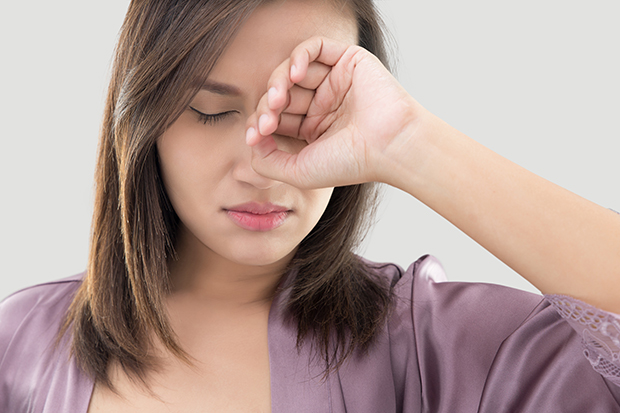
By Heather Hasty, COA, OSC, Bond Eye Associates
Over 300 million people worldwide suffer from dry eye syndrome. Dry eye syndrome is a common and often chronic condition and, until recently, was widely under-diagnosed. Dry eye syndrome is defined as a condition that is caused by a lack of sufficient lubrication and moisture on the surface of the eye causing inflammation.
Tears are made not just of water — they also have a mucus and oil component. The oil layer prevents the liquid layers from evaporating too quickly. The mucous layer makes the tears stick to the eye. Under normal conditions, these three components are continuously made to maintain proper lubrication of the eye.
There are many causes for decreased maintenance tear production, but this is especially significant for women going through menopause. In addition, diseases can affect your ability to make tears, including diabetes, rheumatoid arthritis, lupus, Sjogren’s Syndrome, thyroid disorders, and vitamin A deficiency. Medications including antihistamines, beta blockers, hormone replacement therapy, sleeping pills, and anxiety medications also affect our tear film.
Sustained focus activities such as looking at a computer screen or reading for extended periods of time will also affect your tear film. These activities slow the blink response (much like your breathing is slowed while you sleep), and this does not allow for the necessary periodic smoothing and distribution of the tears over the surface of the eye.
Many patients often notice the impact of dry eyes on their vision before they perceive that their eyes feel dry. Some common dry eye symptoms include the following:
- You feel like your eyes are stinging and burning.
- There is a scratchy or gritty feeling like something is in your eye.
- There are strings of mucus in or around your eyes.
- Your eyes are red or irritated. This is especially true when you are in the wind or near cigarette smoke.
- It is painful to wear contact lenses.
- You have lots of tears in your eyes.
Having a lot of tears in your eyes with “dry eye” might sound odd, but your eyes make more tears when they are irritated due to the emergency response tearing. Irritation from dry eye cannot be differentiated from irritation caused by external sources — the eye responds the same, and the result is tears streaming down your face while your physician is telling you that you have dry eyes.
Dry eye is treated in a variety of ways. There are many manufacturers of artificial tears available over the counter, as well as a variety of formulations and viscosities for different patient needs. There are also prescription eye medications intended to stimulate the body’s natural tear production system. A physician may also recommend a patient include dietary supplements containing Omega-3 fatty acids or that the patient would be a good candidate for punctal occlusion wherein a small plug is inserted into the tear drainage canal(s) to allow the tears to stay in the eye longer. Physicians may also recommend lifestyle changes, such as humidifiers or avoiding direct air currents to supplement any or all the above therapies.
Dry eye is a common condition that can wreak havoc on everyday activities, making something as simple as reading the newspaper a frustrating struggle, but help is available. Bond Eye Associates offers many options to help relieve dry eye symptoms and to help your eyes get back on track producing quality tear film. Dry eye syndrome is a medical diagnosis, so you do not need a vision insurance plan to be treated for dry eyes.
Please call Bond Eye Associates to schedule your yearly vision health exam with confidence knowing that they have been a trusted, locally owned, medical practice for over 36 years. Heather Hasty is a Certified Ophthalmic Assistant with Bond Eye Associates. They are accepting new patients in all three of their locations: Peoria, Pekin, and Canton, IL. Please call 309-692-2020 to schedule an appointment or visit their website at www.bondeye.com.
